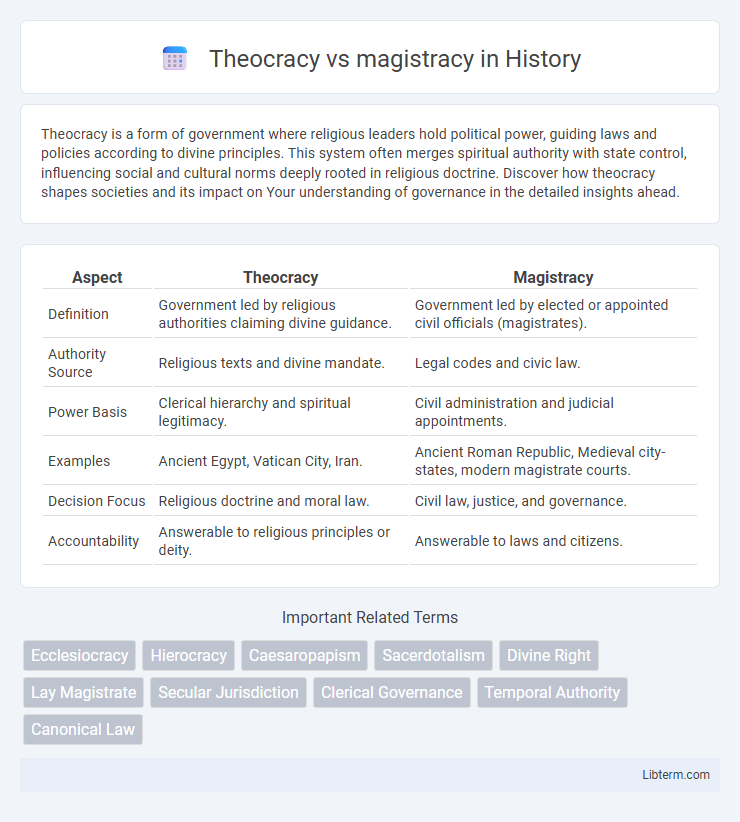Theocracy is a form of government where religious leaders hold political power, guiding laws and policies according to divine principles. This system often merges spiritual authority with state control, influencing social and cultural norms deeply rooted in religious doctrine. Discover how theocracy shapes societies and its impact on Your understanding of governance in the detailed insights ahead.
Table of Comparison
| Aspect | Theocracy | Magistracy |
|---|---|---|
| Definition | Government led by religious authorities claiming divine guidance. | Government led by elected or appointed civil officials (magistrates). |
| Authority Source | Religious texts and divine mandate. | Legal codes and civic law. |
| Power Basis | Clerical hierarchy and spiritual legitimacy. | Civil administration and judicial appointments. |
| Examples | Ancient Egypt, Vatican City, Iran. | Ancient Roman Republic, Medieval city-states, modern magistrate courts. |
| Decision Focus | Religious doctrine and moral law. | Civil law, justice, and governance. |
| Accountability | Answerable to religious principles or deity. | Answerable to laws and citizens. |
Introduction to Theocracy and Magistracy
Theocracy is a form of government where religious leaders rule in the name of a deity, intertwining political authority with divine guidance. Magistracy involves elected or appointed officials, known as magistrates, who exercise administrative and judicial powers within a secular legal framework. The core distinction lies in the theocracy's sacred legitimacy versus the magistracy's institutionalized civic governance.
Defining Theocracy: Governance by Divine Authority
Theocracy is a system of governance where divine authority is the ultimate source of political power, often embodied by religious leaders or institutions. In this framework, laws and policies are directly derived from sacred texts or divine commandments, blending religious doctrine with political rule. Unlike magistracy, which is based on secular judicial and administrative roles, theocracy integrates spiritual authority as the foundation of legal and governmental legitimacy.
Magistracy Explained: Secular Leadership and Law
Magistracy refers to a system of secular leadership where officials, often appointed or elected, administer laws and governance without religious authority. Unlike theocracy, magistracy emphasizes the rule of law grounded in civil statutes rather than divine command or religious doctrine. This form of governance typically ensures impartiality and legal consistency by separating state functions from religious institutions.
Historical Evolution of Theocratic Systems
Theocratic systems trace their origins to ancient civilizations where religious leaders held supreme authority, exemplified by Egyptian Pharaohs and Mesopotamian priests who combined divine mandate with political power. Over centuries, theocratic governance evolved through medieval Europe's Papal States and Islamic Caliphates, where rulers claimed legitimacy through religious doctrine. This evolution highlights a shift from priestly dominance to more structured religious institutions influencing state governance, contrasting with magistracies that emphasize secular, legal authority and civic administration.
Development of Magistracy in Political History
The development of magistracy in political history marks a pivotal shift from theocratic rule to a system of governed authority based on law and civic responsibility. Magistrates emerged as elected or appointed officials vested with judicial and administrative powers, embodying the separation of religious influence from state governance. This evolution fostered the establishment of republican institutions exemplified in ancient Rome, where magistracy became integral to balanced political structure and citizen participation.
Core Principles: Faith-Based vs. Secular Rule
Theocracy operates on core principles where governance is directly grounded in religious faith, with divine authority guiding legal and political decisions. Magistracy emphasizes secular rule, prioritizing law, order, and state authority independent of religious influence. This fundamental difference shapes the legitimacy and enforcement of laws in each system.
Power Structure: Religious Leaders vs. Civil Officials
Theocracy centralizes power in religious leaders who govern based on divine authority and sacred laws, intertwining spiritual and political control. Magistracy places authority in civil officials who exercise secular governance through legal frameworks and institutional roles, maintaining a clear separation from religious influence. This fundamental difference shapes decision-making processes, legitimacy sources, and societal order within each system.
Social and Cultural Impacts of Theocracy and Magistracy
Theocracy often enforces religious doctrines as law, shaping social norms and cultural practices around spiritual beliefs, which can lead to a homogenized society with limited religious and cultural pluralism. Magistracy, grounded in secular legal principles, typically promotes judicial impartiality and encourages cultural diversity by separating religion from state governance, enabling a more inclusive social environment. This distinction influences societal values, individual rights, and cultural expression, where theocracy aligns social identity closely with religious authority, while magistracy fosters legal equality and cultural pluralism.
Modern Examples and Case Studies
Modern theocracies like Iran demonstrate governance where religious leaders hold supreme authority, blending religious doctrine with state laws, while contemporary magistracies such as Singapore exhibit secular, law-based rule with appointed officials enforcing civil order without religious influence. Case studies reveal Iran's integration of Sharia law in its political system contrasts sharply with Singapore's judicial system emphasizing meritocracy and legal professionalism, highlighting diverse governance models in the modern era. The examination of these examples provides insight into how religious authority and secular magistracy shape political stability and legal frameworks worldwide.
Theocracy vs. Magistracy: Comparative Analysis and Future Prospects
Theocracy centers on governance by religious authority, where divine guidance influences laws and policies, contrasting with magistracy, which emphasizes secular, legally appointed officials administering justice and public order. Comparative analysis reveals that theocracy often integrates moral-religious principles into state functions, while magistracy upholds a separation of church and state, promoting rule of law based on codified statutes. Future prospects suggest increasing hybrid models where religious values inform ethical frameworks within secular magistracies, balancing tradition with evolving legal paradigms.
Theocracy Infographic

 libterm.com
libterm.com